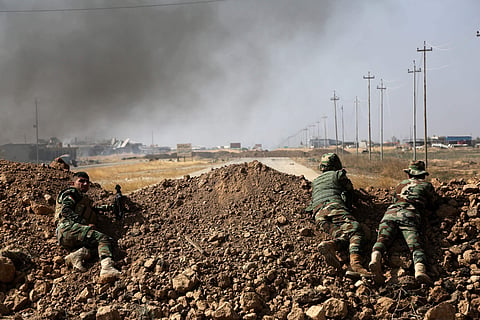

"Entrance to the Village of Three Martyrs, Islamic State," read the black graffiti scrawled in Arabic on the wall of the first house.
Previous residents had known their hometown, outside Mosul, by another name: Badana Gawra, meaning "Big Chest" in the local Kurdish dialect.
When Islamic State of Iraq and the Levant (Isil) took Badana during its lightning strike across northern Iraq in the summer of 2014, the villagers fled with nothing but the clothes on their backs.
A handful were able to return for the first time in more than two years yesterday after Kurdish Peshmerga forces recaptured it from the jihadists. They barely recognised what remained of their village.
What Isil had not destroyed already, US air strikes had bombed to oblivion.
The Daily Telegraph was the first Western media outlet to enter the village, which has been liberated alongside eight others on the road to Mosul.
At the start of the offensive on Monday, 400 Peshmerga troops from the Second Regiment stormed Badana, surprising the militants by taking the dusty path from the east rather than the Tarmac road from the north.
It quickly became clear when assessing the damage that Isil had been preparing for the offensive for months.
They had dug a one-mile-long trench around one side of the village. On the other, sand-coloured blankets disguised barrels of TNT that lined both sides of the main road.
"Look at that black string hidden under the rock," said Captain Hoshiar Harki, pointing to a wire so thin it was barely visible to the untrained eye.
"We have found about 100 booby traps like this so far in 24 hours. There could be hundreds more," he said.
The day before, two of his officers were killed trying to clear a school, which had been turned into a bomb-making factory.
The Peshmerga said 30 jihadists had been guarding the village, spending almost all their time in the final weeks hiding from air strikes in elaborate tunnels. More than 6ft deep, the tunnels had rooms coming off the sides, including several bedrooms and a kitchen fitted with electricity and running water.
Pots of food were still on the stove and there were enough bottles of water stored to last a month.
When the Peshmerga troops fired the first mortars into the village, 15 of the militants downed their weapons and fled. Twelve were shot escaping while two managed to get away.
The rest stayed and fought. Three tried to drive at them with cars laden with bombs. "When we saw them coming fast towards us, we quickly sent details of their co-ordinates to the Americans, who were able to strike them from their jets before they could strike us," Sgt Mawoolud Mohammed said.
The blackened frames of three armoured vehicles containing charred human remains bore out his claim.
"Without the coalition's help there is no doubt that many more Peshmerga would be dead," he said.
The troops have painted large red circles on the roofs of their Humvees to indicate to the warplanes that they are friend not foe.
But Isil is also using the 2,000 Humvees it captured from the retreating Iraqi army, which makes identifying allied forces difficult from the air. Half the village's homes have been razed to the ground by months of US airstrikes that had tried to root out the militants.
On the wall of one of the houses that was still intact, the jihadists had written in big letters: "We will die here for our cause."
"This must have been the worst job in Isil, sitting here in these tunnels in this small village waiting for certain death," Cpt Harki said. "They looked to be mostly teenagers. They had nothing on them - no ID or mobile phone.
"There was just a book with a list of names and how long they were to stay here for as well as an old radio to contact their leaders in Mosul."
The village had been home to several hundred members of the Shabak tribe, an ethnic minority found in Iraqi Kurdistan.
While the Sunni Shabak community identifies as Kurdish, Shia Shabaks consider themselves a unique ethno-religious group.
"It is an incredibly emotional moment to be here again", said 34-year-old former resident Abbas Abbed, dressed in traditional Kurdish sirwal trousers and sash. He could only stay for a few minutes and was unable to enter his house as the Peshmerga said it was still littered with mines.
"We left with nothing that day two years and two months ago," he said. "I hope I can find at least one thing to remind me of my old life and that not everything has been destroyed."
But his greater worry is for the future of his village and his people.
"The Iraqi army failed to protect us. They fled and left us to the barbarians," he said. "What makes us think we can trust them again?"
The Peshmerga is holding the captured villages for now, but it is unclear who will control them after Mosul is liberated.
Asked whether he would return if Badana was one day rebuilt, Mr Abbed simply answers "Inshallah", or God willing.